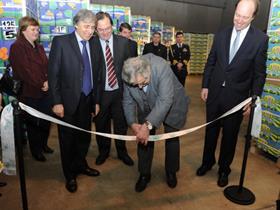
Milagro, the Uruguayan subsidiary of Argentinean citrus giant San Miguel, has inaugurated a new citrus packing facility in San José, according to a press release from the Uruguayan Ministry of Agriculture (Mgap).
Uruguayan president José Mujica attended the opening ceremony, together with agriculture minister Tabaré Aguerre and José Luis Falero, mayor of San José.
The US$3m packhouse measures 5,000m2 and has the capacity to process 6,000 tonnes of citrus each month, Mgap said.
Some 200 employees will work permanently at the facility, with the workforce rising to 1,500 people during peak season which runs from March to October.
President Mujica said the new packhouse characterises a number of identified features in the government’s strategic plan for the citrus industry, including international integration, the opening of new markets, food safety certifications, social sustainability and technological innovation.
He added that Uruguay’s citrus industry has a very good opportunity to grow as a sector but also to serve as a model from which to develop the country’s other agricultural sectors.
In particular, Mujica said those industries which are focused on supplying the local market, such as the apple and pear sectors, could learn from the success of Uruguayan citrus.
Given that the agricultural sector represents 70 per cent of Uruguayan exports, Mujica noted that the objective is to develop the supply chain further and ensure that small and medium-sized producers have access to marketing channels.
The packhouse will be supplied with fruit from Milagro’s 11 citrus groves across the country, including five in San José, four in Paysandía and one in Río Negro as well as from the 15 growers who supply oranges, mandarins and lemons to the company, according to Mgap.
Milagro also operates a nursery in San José, which produces various certified citrus varieties, as well as a citrus juicing and oil plant and another packhouse in Paysandú.
Milagro forms an integral part of the San Miguel group which produces citrus across the Southern Hemisphere in Argentina, Uruguay and South Africa.
Around 95 per cent of the group’s offer is exported to the European Union, Russia, Canada, the Middle East, Asia and Central America, the report said.



